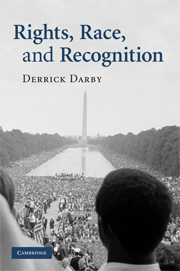2 - Rights without recognition
Published online by Cambridge University Press: 20 January 2010
Summary
One of the so-called self-evident truths proclaimed in the United States of America's Declaration of Independence is that all men are endowed by their creator with certain unalienable rights. Many people still follow the founders in affirming the naturalness of these rights even though nomenclature has varied over the years. But in what sense are these rights natural? And what exactly is the source of these unalienable natural rights which have played such an important role in explaining why governments are instituted among men, what function they serve, and what they must do to guarantee their continued existence?
The answer to the first question—in what sense are these rights natural—appears to be relatively clear. They are “natural” in the sense that human beings are taken to possess them prior to and independent of formal as well as informal governmental or societal recognition. As such they are the product of neither legislative nor customary practices and can thus serve as independent grounds for judging and guiding both legislation and custom, which is the primary reason for positing such rights in the first place. Another way to put the point is to say that natural rights exist prior to and independently of the actions of all positive authority, both governmental and nongovernmental. Although these rights may be independent of all positive law and authority, if men were indeed endowed by their creator with these rights, as the founders proclaimed, then they would not be natural in the sense that human beings possessed them entirely independently of all law and authority.
- Type
- Chapter
- Information
- Rights, Race, and Recognition , pp. 38 - 73Publisher: Cambridge University PressPrint publication year: 2009

